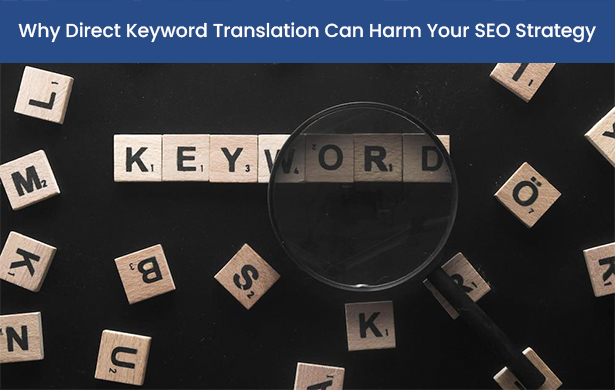
Do you want to reach global audiences? Your website needs more than just a language switch. A critical aspect of these efforts is ensuring that your search engine optimization (SEO) strategy is adapted for different linguistic and cultural contexts. Many companies make the mistake of directly translating keywords from one language to another, assuming that a one-to-one translation will yield the same search rankings and visibility. However, this approach has negative consequences, affecting your brand's reach, engagement, and overall SEO performance.
In this blog, we will explore why direct keyword translation is ineffective, how it can harm your SEO strategy, and why investing in professional keyword localization services is essential for global success. Call us at +91 8237060559 today to optimize your international SEO!
Directly translating keywords from one language to another may seem like a quick solution, but it often leads to ineffective SEO results. From misaligned search intent to cultural nuances, several factors can make direct translation a risky approach. Let's explore the key pitfalls that can hinder your global search visibility:
Search intent plays a crucial role in how search engines rank web pages. When users enter queries into search engines, they have a specific purpose in mind, whether it's informational, transactional, or navigational. Direct keyword translation often fails to capture this intent accurately, leading to misalignment between what users search for and the content presented to them.
For example, while a keyword may have a strong search volume in one language, its direct translation may not reflect the same user behavior in another. Instead of ranking high for relevant searches, your website could end up attracting the wrong audience or not ranking at all due to a lack of alignment with common search patterns in that market.
Languages are deeply rooted in cultural contexts, and different regions have different ways of expressing similar ideas. Direct translations may not capture the nuances of a language, resulting in keywords that sound unnatural, irrelevant, or even inappropriate.
Certain phrases or terms that work well in one language may not be widely understood in another, and failing to recognize these differences can make your content less appealing to local audiences. A poorly translated keyword can also create confusion or misinterpretation, reducing your credibility and engagement with international users.
SEO success depends on identifying keywords with high search volume and ranking potential. Even if a keyword is accurately translated, it may not have a significant search volume in the target language. Without proper keyword research, you might be optimizing your website for terms that users rarely search for, leading to wasted efforts and missed opportunities for visibility.
Keyword competitiveness also varies across different markets. A keyword that is highly competitive in one country may be easier to rank for in another, and vice versa. Direct translation fails to account for these variations, limiting your ability to create an effective SEO strategy.
Each language has unique grammatical structures and word order, which means a direct translation may not fit naturally into common search queries. Some languages require additional words, different phrasing, or alternative sentence structures to convey the same meaning.
Search engines prioritize content that appears natural and relevant to users. If your translated keywords create awkward or incorrect phrasing, your website may struggle to rank well. Ensuring that keywords are both accurate and grammatically appropriate is essential for improving readability, engagement, and overall SEO performance.
Long-tail keywords, which consist of longer, more specific phrases, are a valuable component of any SEO strategy. These keywords often have lower competition and higher conversion potential, making them essential for targeting niche audiences.
Directly translating short keywords without considering long-tail variations can lead to missed opportunities. In many cases, users in different regions may search for products or services using highly specific queries that differ from the direct translations of their English counterparts. Conducting proper keyword research helps identify these long-tail opportunities and optimize content accordingly.
To avoid the pitfalls of direct keyword translation, businesses must focus on keyword localization rather than simple translation. Keyword localization involves adapting search terms to align with regional search behavior, user intent, and linguistic preferences while ensuring they remain relevant to the local audience.
A well-executed keyword localization strategy includes:
By investing in keyword localization, businesses can ensure their content is search-friendly, relevant, and engaging, leading to improved search rankings and increased website traffic.
At Language Services Bureau , we specialize in SEO-driven keyword localization to help businesses expand their online presence in global markets. Our expertise ensures that your multilingual SEO strategy is effective, precise, and optimized for success.
We go beyond simple translation to deliver fully localized keyword strategies and websites that align with your global expansion goals.
Direct keyword translation can be a costly mistake that hinder your international SEO efforts. From misaligned search intent and low search volume to cultural differences and structural inconsistencies, direct translations often fail to deliver optimal results. Instead, businesses should focus on keyword localization, ensuring that search terms are relevant, natural, and competitive in their target markets.
By partnering with Language Services Bureau, you can leverage expert keyword research and localization services to enhance your multilingual SEO strategy, improve search rankings, and attract the right audience in global markets.
Ready to optimize your international SEO strategy? Contact us today!
For any queries related to language translation services. Inquire at our email address below or give us a call today!
info@languageservicesbureau.com
Telephone: +91-20-24470509, +91-82370 60559
Similar articles for you...

आमच्या गेल्या महिन्यातील ब्लॉग मध्ये भाषांचे ज्ञान आवश्यक असणाऱ्या करियर क्षेत्रांची माहिती आपल्याला मिळाली. जिथे भाषेचे ज्ञान फायद्याचे ठरते असे इतर व्यवसाय आपण या महिन्यात पाहुयात.

Posted by : Language Services Bureau

The time it takes to learn a language depends on what you want to do with it– here is a great article about language learning and the kind of expectations you can set about the time required for the same!